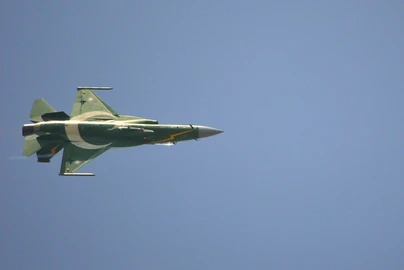Pakistan's Military: a distinctive brand of hegemony

JF 17 Thunder. Photo: Kami Rao, https://www.flickr.com/photos/51715344@N07/21060690990/ License: CC BY 2.0, https://creativecommons.org/licenses/by/2.0/
Since its independence in 1947, Pakistan has had three military coups – in 1958, 1977 and 1999. In each instance, public opinion was initially overwhelmingly in favor of the military, however subsequent popular uprisings and civic movements against the military led to its removal from power.
Pakistan’s current situation is particularly intriguing. Even though there is a ‘democratically elected civil government’ in Islamabad, de facto power resides with the military, and public sympathy favors the military as opposed to the elected government. This very paradox prompted me to select this topic; to look into the hegemony of the Pakistan military, which is not limited only to the duration of a coup.
Pakistan's military's brand of hegemony
My research is unique in the Pakistani context in that I concentrate on the symbolic and cultural aspects of hegemony. I show that Pakistan military’s hegemony does not depend on overt displays of power or subversion of the democratic process. Rather, this hegemony is extended equally effectively through the provision of social sector amenities. To this end I use two case studies – the Frontier Works Organisation (representing the infrastructure sector) and the Fauji Foundation (representing the welfare sector).
Development or nation-building?
One of the main findings of my research is that the military is conducting development activities under the rubric of nation building. The military is well aware of the legal and constitutional boundaries to its presence in the non-defense sectors. My data, however, shows that within its own consciousness, ‘development’ and ‘nation building’ are understood and employed interchangeably. Over the years this has been embedded in the military mind-set to such an extent that they themselves are no longer aware of their own perceptions and subsequent decisions. The net result is that, while they do not hold themselves responsible for development as such, they refer to the overtaking of developmental activities from the civilian government as ‘nation building’. I call this the military’s cognitive dissonance.
Two case studies: Frontier Works and Fauji Foundation
I use the administrative and procedural structures of the two case studies to demonstrate how this is practically implemented. While on the one hand both the Frontier Works Organisation and the Fauji Foundation are military-owned and military-run organizations, they are also profit-maximizing commercial entities. They are structured in such a way that there is no money trail leading either to or from the military. This lends a veneer legitimacy to their operation. Moreover, neither the public nor the hegemon consider it a legal violation.
Benefactor of the people
My research concludes that the Pakistan military has perfected a distinctive brand of hegemony. By conflating development and nation building, the military have secured the image of ‘benefactor of the people’. By distancing itself financially, it has been able to legitimize its activities. The net result is that it does not matter if the space is snatched away from civilian institutions, or if they fail due to their own ineptitude. Military hegemony has space to expand and public support is guaranteed. As long as it controls the socio-cultural elements via the development sector, the military no longer needs to assume direct political control.
About the author:
Rabia Chaudhry is an Assistant Professor at the Center for Public Policy and Governance, Forman Christian College Lahore and a former junior researcher at ZEF.
This article is from ZEFnews 40. For the full issue see:
https://www.zef.de/fileadmin/user_upload/ZEFnews_no40.pdf


